
University of New South Wales Law Journal


|
Home
| Databases
| WorldLII
| Search
| Feedback
University of New South Wales Law Journal |

|
BEGINNING TO ADDRESS ‘THE ELEPHANT IN THE CLASSROOM’: INVESTIGATING AND RESPONDING TO AUSTRALIAN SESSIONAL LAW TEACHERS’ UNMET PROFESSIONAL DEVELOPMENT NEEDS[+]
MARY HEATH,[*] ANNE HEWITT, [**] MARK ISRAEL[***] AND NATALIE SKEAD[****]
The higher education system is one of the most casualised industries in the Australian economy.[1] The number of tertiary students has risen sharply in the last few decades; however, growth in student numbers has been accompanied by a far smaller increase in permanent staff numbers both in universities as a whole[2] and in law schools in particular.[3] Where additional staff have been recruited to respond to rising student numbers, most have been employed on a sessional basis.[4] As a consequence, a significant percentage of academic staff are now sessional employees and non-permanent staff may be undertaking up to half of all teaching in Australian higher education.[5]
The quality of teaching by law teachers, including those employed on a sessional basis, is critical to the experience of law students. It impacts on students’ learning, retention and progress. It is also critical to the capacity of law schools and universities to meet their responsibilities to students and their wider goals in relation to quality assurance and income generation.
One of the obvious places for law schools to look for sessional staff has been the legal profession.[6] Practitioner–teachers should and do play an important role in legal education. They are able to use their professional experience and knowledge to help students develop reflective practice and bridge ‘the gap between the academic and professional worlds.’[7] However, professional expertise does not guarantee an individual has the skills required to be an effective teacher.[8] Sessional law teachers may have limited or no teaching qualifications and little or no teaching experience. The legal academy relies heavily on sessional teachers to teach the growing number of law students, yet the development needs of these teachers are not being adequately addressed.[9] This, for us, is the ‘elephant in the classroom’ of legal education in Australia. Australian law schools need to ensure the ‘just-in-time’ availability of discipline-specific, pitch-appropriate development resources to support those sessional law teachers at the coalface.
This article reports on the Smart Casual Project which considered the current development opportunities available to sessional law teachers, and created and evaluated a series of discipline-specific development resources to fill the gap. We examine the need for discipline-specific development for sessional teachers in law with reference to Australian and international literature, review the development opportunities currently available to sessional law teachers around Australia, and report on a survey of sessional teachers at three Australian law schools that identified academic development tools that sessional teachers recognise they require to support their teaching. Finally, we discuss the development, trial and evaluation of resources created to support the teaching of Australian sessional law teachers as part of the Smart Casual Project. Unsurprisingly, we conclude by advocating for an extension of projects like the Smart Casual Project to respond to the ‘elephant in the classroom’ and ensure excellence in sessional teaching in Australian law schools.
As Cowley argued, finding an appropriate definition for this group of academics matters because they are too often excluded from conceptions of the academic workforce, rather than being perceived as valued and vital members of larger teaching teams.[10] Given the range of terminology and employment structures used around Australia, we have adopted the broad definition of sessional teachers used by Debra Herbert and her colleagues, namely: ‘university instructors who are not in tenured or permanent positions.’[11] In addition, we adopt the RED Report’s terminology of ‘sessional teaching staff’.[12] The term ‘sessional’ avoids the negative connotations that may be associated with ‘casual’ teaching.[13]
Several national projects have emphasised the need for and lack of provision of high quality professional development opportunities for sessional staff. Funded by the Australian Universities Teaching Committee, the 2003 ‘Training, Support and Management of Sessional Teaching Staff’ project identified a widespread lack of ongoing professional development and support for sessional teachers.[14] The 2008 RED Report found a particular gap relating to the leadership and management of sessional teachers by course coordinators, arguing that it jeopardised the quality of the student learning environment.[15] This led the Australian Learning and Teaching Council to fund the ‘Coordinators Leading Advancement of Sessional Staff’ project which reported in 2011.[16]
Despite these projects, support and training for sessional teachers still appears inadequate.[17] Suzanne Ryan and her colleagues’ recent research explored how Australian sessional staff were excluded ‘from conditions and benefits, and from workplace and infrastructure support.’ [18] They experienced underpayment, poor management, unpredictability of work and delayed access to infrastructure including internet access and library resources.[19] There is also evidence of a longstanding lack of access to opportunities for developing teaching practice.[20]
Sadly, this problem is not unique to Australia, nor to the discipline of law; it is recognised around the world in a wide variety of tertiary institutions and across disciplines.[21] Finding a solution is complicated by the fact that different disciplines have varying expectations of sessional staff. It is not ‘one size fits all’ when it comes to the professional development of sessional teachers.[22]
In the last two decades, a new paradigm for learning and teaching has emerged across the Australian higher education sector: a focus on quality and standards. The establishment of the Tertiary Education Quality and Standards Agency (‘TEQSA’) affirmed the federal Labor government’s commitment to ‘ensuring that growth in the higher education system will be underpinned by a robust quality assurance and regulatory framework’.[23] This approach continued the work of the Australian Universities Quality Agency, which consistently called for the introduction and systematisation of support for sessional staff across the sector.[24]
TEQSA quickly identified a ‘significant reliance on academic staff employed under casual work contracts’ as one of the key risks to the reputation of Australian higher education.[25] While the influence of TEQSA on the university sector may be waning, any regulatory focus on quality teaching and the role of sessional staff provides further reasons for the development, adoption and use of appropriate development strategies in all institutions.
Professional development for sessional teachers (as for other academic staff) has three primary purposes. It should enable sessional teachers to develop professionally, help students learn, and work towards wider school and university objectives.[26] Resources created for sessional staff should contribute to the achievement of one or more of these purposes and do so in a manner that is accessible, sustainable and effective.
University students have reported they ‘expect a high-quality learning and teaching experience, delivered by teaching staff well versed in disciplinary context and teaching methodology.’[27] These expectations resonate with the issues sessional staff have identified as areas in which they want help. For example, Bronwyn Bevan-Smith and her colleagues conducted a survey in 2009 of sessional teachers at a research-intensive university which concluded that sessional teachers were particularly interested in: giving effective feedback; learning how to mark assessment items; coping with difficult classroom situations; planning and managing a class; and developing their teaching styles.[28] Louise Wilson also identified that new sessional teachers wanted assistance with managing teaching and students, and on assessment, grading and feedback.[29] We traced similar concerns in response to the survey of sessional teachers in law run as part of the Smart Casual Project.
If universities want highly skilled, committed and motivated sessional staff, those institutions need to demonstrate their commitment by providing high quality professional development.[30] This may be particularly important in professional disciplines such as law where retention of prestigious and highly skilled practitioner–teachers may depend more on the relationship between schools and sessional staff than on the purely transactional nature of sessional employment.[31] These practitioner–teachers often see their teaching as means of providing a service to their profession, maintaining ties with their alma mater and fostering a close synergy between the study and practice of law.[32]
Many Australian universities have invested time and resources in formulating general policies and guidelines to ensure quality of academic instruction. Generic, systematic and coordinated institution-wide support has become an important part of supporting sessional staff.[33] However, we argue that university-wide programs have significant limitations if left to stand alone. According to Frederic Jacobs, ‘[u]niformity of practice ... may be administratively efficient but [it is] educationally unsound.’[34] Various authors operating outside law have reached the same conclusion though on different grounds. In Australia, David Boud maintained it is at the site of academic practice – the school or faculty in which a sessional teacher works – ‘that academic identity is formed and is most powerfully influenced.’[35] In New Zealand, Alison Viskovic claimed that working knowledge and teacher identity developed in the discipline or teaching team.[36] In the United Kingdom, Mick Healey and Alan Jenkins supported a discipline-based approach to academic development because teachers must ‘translate’ ‘generic forms of teaching into the culture of a discipline’, and link ‘curriculum development to a discipline’s conception of knowledge.’[37]
Based on empirical work with a group of British part-time university teachers that explored how they developed their expertise as teachers, Peter Knight et al proposed effective teacher development should be ‘ecological’ in that it is evoked by engagement with other colleagues.[38] This finding is echoed in the literature on communities of practice.[39] As a result, Anne Gaskell proposed a series of principles to underpin professional development activities. First, development cannot be a ‘one-off event’; it is an ongoing process. Second, development should be collaborative, and third, it should encourage reflective practice.[40] Generic, institution-wide courses at the beginning of the year are unlikely to reflect these principles because, as Jillian Hamilton and her colleagues identified, generic development programs:
are offered to sessional academics at the commencement of their contracts or the teaching semester, they (necessarily) provide pre-emptive training and advice, which is encapsulated in the moment of delivery. Local approaches are also needed to address unique faculty contexts with their varied cultures, processes and practices. And ongoing, just-in-time support and advice is needed to enable inexperienced sessional academics to successfully navigate the complexities of their day-to-day teaching.[41]
Finally, the limited evidence that exists about the support sessional teachers themselves seek suggests they too want discipline-specific support.[42] So, across the board, sessional staff appear to both need and want discipline-specific development.
The need for discipline-specific development programs may be even greater in law than for many other disciplines. The motivation and professional experience of sessional law staff, the needs of law students, and the discipline and practices of law seem to us to be sufficiently different to warrant specific attention. Sessional law teachers, particularly those in legal practice, may have a range of professional commitments including time-consuming mandatory professional development obligations in law that shape when and how they will actually make use of development opportunities. Wilson, for example, found professionals wanted development to be time-efficient and delivered as and when they needed it rather than when institutions found it convenient.[43] Practitioner–teachers are also less likely to be (or have been) research higher degree students, are less engaged with the tertiary sector, and have limited access to professional development opportunities in education.[44]
Law students are also often atypical of students at their institutions. They are training for a socially-bounded profession. Sessional staff working in the profession can play a critical role in assisting students to build professional networks and negotiate the transition from the academic to the professional context.[45] The need for law teachers to support students in building bridges into the profession has become progressively more important as students are drawn from increasingly diverse backgrounds. Law schools now attract students from groups traditionally underrepresented in the legal profession: Indigenous peoples; those who are first in family and/or from lower socio-economic backgrounds; and people from remote and regional areas.[46] Few have pre-existing professional networks or family connections into professional life. Sessional staff need to be well equipped to recognise and respond to the strengths these students bring to the law as well as the challenges they will experience during study and in their future professional lives.[47] These needs are rendered more acute by nationally articulated demands for legal education to prepare students to be responsive to the diversity of Australian society[48] and participate in improving access to justice for populations which have historically been inadequately serviced by legal professionals.
The need for high-quality sessional staff who are equipped to teach and support students is also crucial given the evidence that law students experience higher levels of psychological distress and risk of depression than the general population, regardless of levels of achievement or working hours.[49] Law schools nationally and internationally are working to support student resilience and wellness, and sessional staff in law need to be well equipped to participate in these initiatives.[50] The research literature suggests student wellness must be considered and acted upon across the entire curriculum as well as in co-curricular activities, support, assessment and feedback.[51] The effectiveness of these strategies and initiatives will be undermined unless all law staff, sessional staff included, are sufficiently well trained.
Finally, law itself is different. Legal discursive practices, legal method, case analysis, statutory interpretation, legal ethics and legal problem solving are all unique to the discipline and must be embedded throughout the curriculum. Students require support to develop the Threshold Learning Outcomes (‘TLO’) identified in the Australian Learning and Teaching Council (‘ALTC’) Learning and Teaching Academic Standards Project[52] and elaborated by law academics in the subsequent ALTC-funded Good Practice Guides.[53] These outcomes comprise legal knowledge (TLO 1); legal ethics and professional responsibility (TLO 2); legal reasoning (TLO 3); legal research skills (TLO 4); communication and collaboration (TLO 5) and self-management (TLO 6). As Sally Kift has argued, there is an ‘absolute imperative for teacher training in the new tertiary paradigm that embraces the value of graduate capability development.’[54]
Our aim through the Smart Casual Project has been to contribute to the provision of contextualised development opportunities for the broad range of Australian sessional teachers in law through the development of time-efficient, discipline-specific resources that can be accessed on an ‘as needs’ basis. In addition, we sought to initiate distribution strategies that encourage the adoption of the resources across Australian law schools, and the resources are available free and online.[55] We also recognise the importance of developing situated, informal opportunities for learning and networking among sessional teachers and we hope to address this last need in a follow-on project. Of course, these are not the only challenges for professional development of sessional staff. There are fundamental sectoral issues to address surrounding pay, working conditions and career progression. The ability to achieve changes at the level of the discipline will inevitably be constrained by these broader matters.
As part of the Smart Casual Project, we surveyed Associate Deans of Learning and Teaching (or their equivalent, or their nominees) in all Australian law schools to identify what development opportunities institutions were making available to their sessional teachers.
Our team contacted Associate Deans by email and, where necessary, followed up by telephone or Skype. All four authors have served as Associate Deans and so we were often drawing on existing professional relationships. Twenty eight of the 36 law schools (78 per cent) responded. Of the responding universities, 75 per cent reported that they offered formal generic induction programs for all sessional staff. In approximately half of these institutions (47 per cent) sessional staff were paid to attend these induction programs.
Figure 1: Prevalence of University-Level Induction
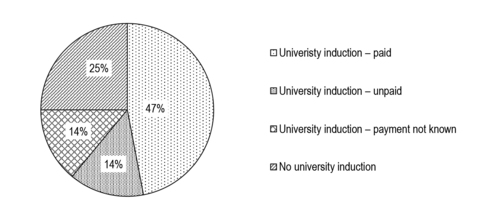
Twenty five law schools (89 per cent) reported that some form of introduction to teaching was offered to sessional staff at the level of the discipline. This included formal (workshop, seminar or induction session) and informal (ad hoc meetings on an ‘as needs’ basis) teacher development. Ten law schools (40 per cent) paid sessional staff to attend formal and/or informal development sessions.
However, not all development opportunities available to sessional law teachers were either discipline-specific or teaching-focused. Most introductory development opportunities offered by law schools were, in fact, either generic or focused on administrative matters (eg, use of technology, orientation around the law building, information regarding the law library and other available resources, tours of offices, and introductions to general policies and procedures). Very little training was offered on teaching itself and even less on teaching in law. In addition, 11 per cent of respondents indicated sessional staff in law had no access to any training or development at all. So, despite clear recommendations in the literature, discipline-specific professional development directed at improving teaching quality in law appeared to be very limited.
Figure 2: Formal and Informal Development in Law Schools
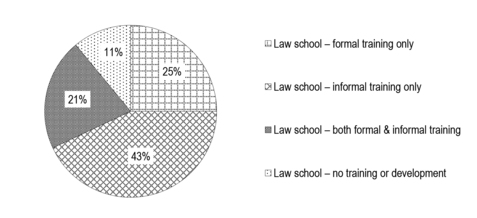
While sessional law teachers at most institutions received some introductory training, the availability of ongoing development and support was much less consistent. Only ten schools provided ongoing support and development opportunities for sessional staff. Even there, the Associate Deans suggested they were not well advertised to staff, not well used, and the vast majority of staff (70 per cent) were not paid for undertaking such activities.
Figure 3: Ongoing Development Opportunities
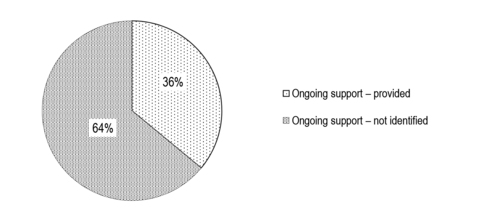
In summary, while the majority of law schools around Australia are committed to offering some training and development opportunities to sessional staff, these opportunities are limited and may be poorly focused. In particular there is a notable lack of discipline-specific and teaching-focused development opportunities. Australian sessional staff in law need improved resources to help build their teaching skills. The scope of this problem is significant – in terms of the number of law schools, number of sessional law staff, and number of law students affected.
While there are good reasons for institutions to believe discipline-specific development tools might be more useful to their sessional teachers, we were keen to discover whether sessional teachers shared this view. So, as part of the Smart Casual Project, we surveyed sessional staff at the University of Adelaide, Flinders University and the University of Western Australia (‘UWA’).
Sessional law teachers had had a variety of experiences with teacher-development resources prior to this trial. Adelaide Law School runs an induction workshop and has created a series of self-directed modules and a regular sessional teacher induction workshop for sessional staff. The UWA Faculty of Law offers a discipline-specific teaching workshop. In addition, the university offers institution-wide development workshops and a sessional staff professional development day. At Flinders Law School, generic teacher training is available and staff are paid to attend.
The three law schools reported employing 108 sessional staff in 2013. Fifty nine of these teachers responded to the survey, a response rate of 55 per cent.[56] The majority of respondents were also students, and around a third worked in legal practice. Respondents had a mean age of just over 36 years, and 53 per cent were female. Nearly half of the respondents (45 per cent) had been teaching for between three and five years, providing an average of 3.3 years. Most respondents taught either between four and six hours per week (42 per cent) or between one and three hours per week (37 per cent).
A large proportion of respondents identified Private Law as their primary teaching area (37 per cent) with almost another quarter teaching in Commercial Law and another quarter Public Law. Others taught Legal Research, Legal Theory, Clinical Legal Education, Criminology, Law and Society and areas such as Procedure and Advocacy. The presence of socio-legal studies and criminology in the sample reflects the responsibility of two of these law schools for running undergraduate majors within Arts and Commerce degrees.
We asked respondents about their experience with nine different teaching development activities (Figure 4). Not surprisingly, activities that required the least effort had been engaged in most commonly. These included thinking about teaching, speaking with staff about teaching, and reviewing student evaluations. The activities that required the greatest amount of effort, for example keeping a teaching journal, were the least common activities. Working through a teaching manual and/or module was the second least common development activity, suggesting teaching and learning manuals and/or modules were not readily available for the majority of respondents.
Figure 4: Percentage of Respondents Engaged in Each Type of Activity
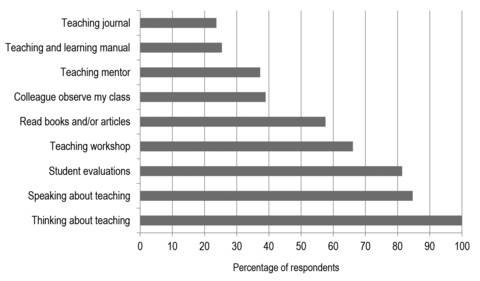
Familiarity with professional development seemed to encourage further engagement. Data presented in Figure 5 reveals that participants with experience of a particular teaching activity (eg, teaching journal, teaching mentor) consistently rated the experience more favourably across different types of evaluations (enjoyment, increased confidence, relevance to law, etc.) compared to those participants without experience of a particular activity. Therefore, results suggest that the more experience sessional staff have of teaching development activities, the more favourable their attitude towards those activities.
Figure 5: Mean Agreement Rating for a Number of Evaluative Statements Averaged across Teaching Activities Listed in Figure 4[57]
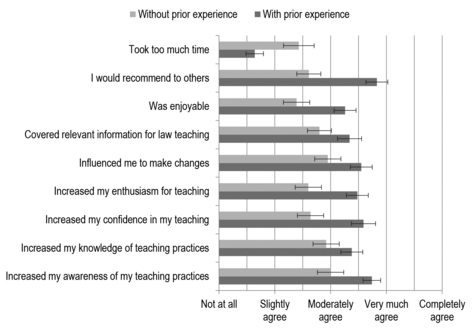
In order to compare the respondent evaluations across the different teaching activities an overall appraisal score was calculated for each activity by averaging across the different evaluative statements presented in Figure 5.[58] We noted already that respondents who had experienced a particular activity reported a more positive attitude compared to respondents without experience of a particular activity. This was taken into consideration in the presentation of data in Figure 6. When sessional staff had experienced an activity, they were particularly positive towards activities that offered mentoring and feedback from a colleague who had observed their teaching. When sessional staff had not experienced an activity, their expectations were particularly low regarding keeping a teaching journal or reading books and/or articles. However, as can be seen in Figure 6, respondents with experience of these activities gave them substantially higher ratings. This suggests that to facilitate the initial process of staff engagement with professional development we need to start with more basic social and/or practical activities followed by more intense development of knowledge (books and/or articles) and self-reflection (teaching journal).
Figure 6: Mean Overall Appraisal Ratings of the Different Teaching Activities Rated by Respondents without Prior Experience, and the Expectations of Respondents with Prior Experience[59]
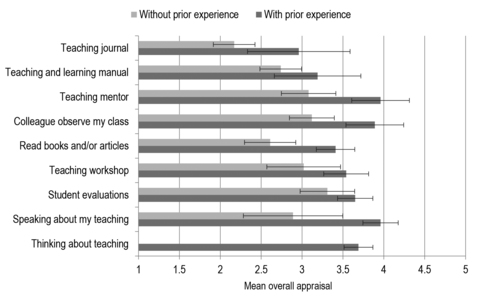
We asked survey respondents to indicate their confidence in, and desire to improve their ability in, a range of teaching-related areas (Figure 7). Sessional teachers were particularly interested in improving both their confidence and their ability in: facilitating critical thinking in students; encouraging and managing class participation; providing feedback; and facilitating student understanding of substantive content. However, respondents were only moderately interested in obtaining knowledge about theories of teaching, improving their ability to reflect upon teaching practices, and improving their ability to facilitate and manage student participation online. Wanting to develop confidence and ability in any one of the ten areas was associated with wanting to develop confidence and ability in all other areas.
Figure 7: Areas of Teaching in Which Respondents Would Like to Improve Their Confidence and Ability[60]
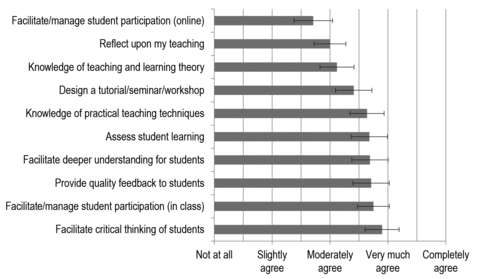
Only half of the respondents had participated in teaching development programs. Overall, they had a positive attitude toward professional development programs even if they had not actually participated in such programs. However, they identified several reasons for not engaging in more teaching and learning professional development activities: the lack of available professional development programs (22 per cent); a lack of time available to commit to professional development (20 per cent); a reluctance to spend time on professional development activities if not being paid to do so (12 per cent); professional development programs with content that was too basic (five per cent); unavailability of programs aimed at teaching law (five per cent); and a belief that they could improve simply by taking on more teaching (two per cent).
While most respondents indicated that for their future development needs they would prefer a one-off program (58 per cent), a significant number were willing to be part of an ongoing program (37 per cent). From a prepared list of possible development activities, over half the respondents wanted to (from most to least popular): talk with other staff about teaching; think about teaching methods before and/or after class; attend a workshop; have a colleague observe their teaching; have formal meetings with a mentor; and review student evaluations. Far less popular were (from most to least popular): working through a teaching manual and/or module; reading books and/or articles on teaching; and keeping a teaching journal.
Finally, sessional law teachers identified teaching techniques they had tried in the past (Table 1).
Table 1: Teaching Techniques Previously Used by Respondents
|
Teaching Technique
|
Frequency
|
% Sample
|
|
Paired or group work
|
50
|
85
|
|
Brainstorming
|
40
|
68
|
|
Structured legal problem-solving (eg, MIRAT or IRAC)
|
34
|
58
|
|
Changed seating arrangements to facilitate discussion
|
30
|
51
|
|
Socratic method for class discussion
|
27
|
46
|
|
Role plays
|
21
|
36
|
|
Moots
|
19
|
32
|
|
Multimedia
|
17
|
29
|
|
Online discussion boards
|
14
|
24
|
|
Scaffolded discussion
|
11
|
19
|
|
Fishbowl
|
7
|
12
|
|
Flipped classroom
|
5
|
9
|
Other teaching techniques respondents had used included: debates; class discussion; class quizzes; use of the whiteboard for canvassing complex concepts; and humour. In an illuminating response, one sessional teacher commented:
I use the methods that the course coordinator asks me to use. I’m not being paid to dream up teaching techniques. I’m being paid to teach a class and to convey the necessary material to the students. If the course coordinator wants me to do this in a specific way, he/she will tell me to do that.
Although the majority of respondents acknowledged that they had the autonomy, resources, time and experience to implement new teaching practices, many were reluctant to do so – 65 per cent of participants were concerned new teaching methods might not be effective, while 30 per cent reported themselves as being too shy to try.
Figure 8: Reasons Participants Have Not Engaged in New Teaching Practices
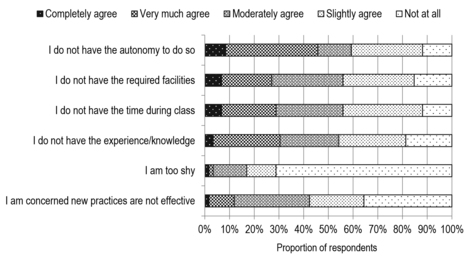
The majority of respondents expressed a preference for one-off, face-to-face, professional development opportunities. However, there are several reasons for questioning the wisdom of such a strategy. First, it may not meet the needs or availability of a diverse group of staff. Secondly, face-to-face sessions are resource intensive and may be beyond the means of law schools that rely heavily on sessional staff.
Given the principal reasons respondents did not engage in teacher development were because they were unaware of suitable programs, did not have time to commit to those that were running and were not prepared to do so without payment, it is possible that if there were time-effective, time-flexible, accessible resources available that were relevant to their particular needs, sessional teachers might well consider using them. Through the Smart Casual Project, we sought to develop, trial and evaluate resources that met these requirements. As sessional staff had reported reluctance to undertake unpaid professional development, we offered to pay them for their time.
As part of the Smart Casual Project, we produced a suite of development resources for sessional law teachers. The Smart Casual resources currently consist of three online interactive teaching modules providing guidance for sessional teachers on: engaging law students in the classroom; teaching legal problem solving; and marking and giving feedback on law assessments.
Given the results of the survey, this strategy might seem perverse. After all, the sessional law teachers we surveyed did not view teaching and learning manuals and/or modules as favourably as several other strategies. However, very few staff had previous experience with these resources and those that had worked through manuals had found them to contain little more than information relating to university administration, and teaching and learning policies. The modules developed as part of the Smart Casual Project were directed at achieving far more than this. We sought to develop modules that were ‘SMART’: ‘Specific’ to the teaching of law; ‘Meaningful’ to the needs of law teachers; ‘Accessible’, allowing sessional teachers to access and refer back to the resources as required; ‘Realistic’, easily applicable to the varied contexts in which session teachers work and their many roles; and ‘Time-efficient’ by being as concise as possible without sacrificing content.
Collectively, the three modules start to address the four areas in which sessional staff indicated a desire to improve both their confidence and ability: facilitating critical thinking in students; encouraging and managing class participation; providing feedback; and facilitating student understanding of substantive content. Each module consists of a literature review and resources guide, and a toolbox of strategies and ideas based on sound pedagogical principles that can be accessed by sessional law teachers to support and improve their teaching practices.
The three modules address specifically: how to engage students as active participants in learning law; how to use structured approaches to foster students’ context-specific and generic legal problem-solving skills; and how to provide useful formal and informal feedback to all law students throughout the learning process. They offer self-directed development activities with which sessional teachers can engage just-in-time and provide a teaching resource that will be available to law schools on an ongoing basis. Although these resources address concerns about working with students that may be common to many disciplines, we sought to address them in ways that are directly relevant to sessional staff in law.
The modules were trialled by sessional staff, reviewed by our Expert Advisory Group comprising leading national and international legal scholars and educators, and revised in the light of their feedback.[61]
Figure 9: Evaluation and Revision Process
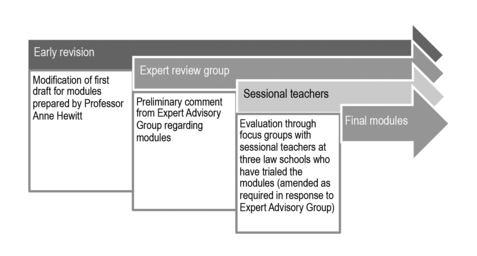
Members of the Expert Advisory Group were keen for development tools for sessional teachers to ‘be about sharing, not training’. Significant revision of the modules followed – we changed the tone of the modules from one of instruction to one of peer-to-peer discourse through the introduction of video clips of sessional staff talking about their teaching, interactive questions, contextualised examples and multimedia resources.
The reworked modules were then trialled by 28 sessional law teachers at the University of Adelaide, Flinders University and UWA Faculty of Law while small focus groups were run in Perth and Adelaide with teachers who had participated in the trial.[62] The focus groups encompassed PhD students, members of the legal profession and individuals for whom sessional teaching was a primary work focus. The focus groups were audio-recorded with the consent of participants, partly transcribed and identifying material redacted to maintain anonymity beyond the confines of the focus group.
While a number of constructive suggestions for improvement of the three trial modules were made, there was overwhelming support from focus group participants for the three modules. Both newer and more experienced teachers agreed the subject areas were useful and relevant to their teaching practices, and approved of the self-directed format. As one participant stated:
The content was perfect. Every question I had over the last three years was answered by these modules ... However I think you always need to reflect and revise your skills, so this is something I could pick up again in two or three years’ time and look over and still get something out of.
Participant feedback overwhelmingly confirmed their belief that there was a need for discipline-specific resources for law teachers:
Participant 1: It was really pleasing to open the modules and think ‘oh, someone is really concerned about me and what I’m doing’. Normally you get things that are vague and generic and just about ‘teaching’ not teaching law. Which is very, very different.
Moderator: Why is it different?
Participant 1: Cultural reasons.
Participant 2: The profession.
Participant 1: The students.
Participant3: Students’ expectations, their ambitions, everything, their perfectionist qualities.
Participants at each institution also claimed insufficient discipline-specific and teaching-focused development opportunities were available to them:
Every module was extremely important. When I first started tutoring three years ago I literally got a textbook handed to me and a topic guide and they said ‘off you go’. I had never done any teaching before and had no idea what I was doing. And I felt sad when I went through this USB [containing the three trial modules] because I thought ‘luckily enough I have developed all of these things myself, and I do all of these things, but it has taken me three-and-a-half years to figure it out. If I had just had someone hand this [the modules] to me they would have got a lot more quality out of me from the get go’.
Others had not found generic teacher-development resources or opportunities very useful:
Participant 4: The [face-to-face induction] session we went to was not discipline-specific – it was the whole uni and all of the casual tutors who were starting out. I think that let it down a bit because the way law is taught is very different to everything else, really.
Participant 5: Yeah ... that’s a good point.
Participant 4: And, compared to someone who is going in to taking eight hour labs once a week the requirements on us are very different. It makes it hard to generalise ... for instance, how to handle a problem situation; ‘oh, but my problem is a chemical spill’.
While the feedback from focus groups confirmed the Smart Casual modules helped respond to an important area of need, participants also suggested a variety of other topics and areas in which they felt insufficiently supported, such as: identifying and managing cultural issues in the law classroom; effective teaching and feedback in an online learning environment; teaching legal writing skills; managing student stress; promoting wellness and dealing appropriately with accommodating students with disabilities in the classroom; and negotiating the expectations of the role of sessional teacher in their institutional context.
The Smart Casual Project highlighted some possible future directions for enhancing the quality of legal education in the context of an increasingly casualised workforce. The feedback we received from sessional teachers, Associate Deans and experts in the field indicated that there are, of course, discipline-specific professional development needs for sessional staff in law that go beyond the three modules the Smart Casual Project created. We argue that future work should address the additional topics of wellness in law; ethics and professional responsibility; communication and collaboration; critical thinking, and case reading and statutory interpretation.
While these topics reflect a shift in the law curriculum beyond mere transmission of legal knowledge, they offer a relatively restricted view of what law schools and their sessional staff do. The integration of strategic themes such as indigenisation and internationalisation across the teaching of an entire professional law program is placed at risk when sessional staff do not have access to professional development opportunities. Such a lack of professional development opportunities may limit their capacity to integrate what may be perceived as difficult and unfamiliar themes into their day-to-day teaching, assessment, support and feedback roles. The quality of development programs is similarly diminished when sessional staff are not trained to implement online teaching strategies or respond to the increasing diversity of the student cohort they are teaching. Integrating these themes into training resources will better equip sessional staff to tackle these key issues within their teaching.
Many law schools lack the resources to implement discipline-specific professional development for sessional staff which integrates curriculum-wide themes. Law schools need help placing professional development modules within a wider teacher development program.[63] In addition, we would argue that sessional staff in law would benefit from an online interactive space in which sessional staff are able to interact with one another, using reflection on the development modules as an initial point of contact. We hope, among other things, to initiate such an interactive space in Smart Casual Project 2, a project that has been funded by the AGOLT for 2015 and 2016.
The Australian higher education sector is increasingly dependent on its sessional workforce. Pressures to casualise are variously attributed to: the impact of the national economy on university budgets; an intensification of focus on research performance; a shift to demand-driven funding; pressure from unions and students, and changes in staff work preferences. Whatever the drivers, none of these pressures seem likely to recede. The deployment of sessional staff to respond to pressures such as these leaves universities caught between the dual demands of financial risk management and quality risk management strategies. While money is saved by cutting long-term investment in the career development of permanent academic staff, casualisation strategies mean replacing them with sessional teaching staff with less experience in teaching and less time to think strategically about the skills that future modes of delivery and student cohorts might require. While we cannot address all the concerns of sessional staff relating to pay and working conditions, Smart Casual Project is an attempt to respond to the needs of sessional staff for relevant and timely professional development in teaching and learning.
The pressing need to respond to the needs of sessional teachers in higher education with high quality, discipline-specific professional development resources is not limited to Australia. There are many classrooms and many elephants. We anticipate the Smart Casual professional development resources and the strategies for their implementation may be of interest to law schools in other common law systems facing similar or greater levels of casualisation. Further, while we have made the case that discipline-specific resources are needed in law, a similar case could well be made in relation to a range of other professional disciplines. Some of the acute issues faced by law, such as the need to support time-poor sessional staff practising within the profession, are equally significant in other disciplines where practitioners make up a significant part of the sessional academic workforce. We therefore anticipate that provision of high quality support for sessional staff in law might represent a model other disciplines will find valuable.
[+] Support for this project has been provided by the Australian Government Office for Learning and Teaching (‘AGOLT’) in 2013. The views in this project do not necessarily reflect the views of the AGOLT. This article draws on the Final Report of this project: Mary Heath et al, ‘Smart Casual: Towards Excellence in Sessional Teaching in Law’ (Final Report, University of Adelaide, Flinders University and University of Western Australia, 2014) <http://www.lawteachnetwork.org/resources/Smart%
20Casual_Final%20project%20report%202014.pdf> (‘Smart Casual Project’). The authors would like to acknowledge the research assistance of Shane Rogers and Skye Schunke in undertaking this project and preparing to write this article.
[*] Associate Professor, Flinders Law School, Flinders University.
[**] Associate Professor, Adelaide Law School, University of Adelaide.
[***] Professor, Faculty of Law, University of Western Australia.
[****] Senior Lecturer, Faculty of Law, University of Western Australia.
[1] Alisa Percy et al, ‘The RED Report, Recognition – Enhancement – Development: The Contribution of Sessional Teachers to Higher Education’ (Report, Australian Learning and Teaching Council, June 2008) <www.cadad.edu.au/file.php/1/RED/index.htm> (‘RED Report’). The foreword of the RED Report suggests that in 2008 ‘[b]etween 40 and 50 per cent of teaching in Australian higher education [was] done by sessional staff’. This is significantly higher than the casual employment rate of 25 per cent across all sectors: Australian Bureau of Statistics, Casual Employees (June 2009) <http://www.ausstats.abs.gov.au/ausstats/subscriber.nsf/0/31E34D4A18F4701ECA2575E40018E16A/$File/41020_casuals.pdf> . See generally, Jill Cowley, ‘Confronting the Reality of Casualisation in Australia: Recognising Difference and Embracing Sessional Staff in Law Schools’ [2010] QUTLawJJl 2; (2010) 10 Queensland University of Technology Law and Justice Journal 27.
[2] Denise Bradley et al, ‘Review of Australian Higher Education’ (Final Report, Department of Education, Employment and Workplace Relations (Cth), December 2008) 22–5 <http://gellen.org.au/wp-content/uploads/2011/04/Higher_Educatio_Review.pdf> .
[3] Frank P Larkins, ‘Student and Teaching Staff Trends in Selected Australian Universities’ (Australian Higher Education Policy Analysis, L H Martin Institute, March 2012) <http://www.lhmartininstitute.edu.au/userfiles/files/Blog/Uni%20Staffing%20Trends_FLarkins_Mar2012.pdf> Frank P Larkins, ‘Student and Teaching Staff Trends in Selected Australian Universities Part 2’ (Australian Higher Education Policy Analysis, L H Martin Institute, April 2012) <http://www.lhmartininstitute.edu.au/userfiles/files/Blog/Uni%20Staffing%20part%202_F%20Larkins_Apr2012.pdf> .
[4] Hamish Coates et al, ‘Australia’s Casual Approach to Its Academic Teaching Workforce’ (2009) 17(4) People and Place 47, 48–9.
[5] Junor estimates that 40 per cent of academic staff are employed on a sessional basis: Anne Junor, ‘Casual University Work: Choice, Risk, Inequity and the Case for Regulation’ (2004) 14 Economic and Labour Relations Review 276, 276, citing J Buckell, ‘Fixed-Term Drift Halted’, Higher Education Supplement, The Australian (Sydney), 17 December 2003, 19. Coates et al suggest casual staff ‘increased from 12.6 per cent of [all teaching staff] in 1989 to 22.2 per cent in 2007’: ibid 48.
[6] See Cowley, above n 1, 36–9; Junor, above n 5, 286.
[7] Joseph Chan, ‘The Use of Practitioners as Part-Time Faculty in Postsecondary Professional Education’ (2010) 3(4) International Education Studies 36, 36.
[8] Coralie McCormack and Patricia Kelly, ‘How Do We Know It Works? Developing and Evaluating a Professional Development Programme for Part-Time Teachers’ in Fran Beaton and Amanda Gilbert (eds), Developing Effective Part-Time Teachers in Higher Education (Routledge, 2013) 94, 106; Yenna Salamonson et al, ‘A Comparative Study of Assessment Grading and Nursing Students’ Perceptions of Quality in Sessional and Tenured Teachers’ (2010) 42 Journal of Nursing Scholarship 423, 424.
[9] Salamonson et al, above n 8, 424.
[10] Cowley, above n 1, 29.
[11] Debra Herbert, Rachel Hannam and Denise Chalmers, ‘Enhancing the Training, Support and Management of Sessional Teaching Staff’ (Paper presented at the Australian Association for Research in Education Annual Conference, Brisbane, 1–5 December 2002) 3.
[12] Percy et al, above n 1, 4.
[13] Cowley, above n 1, 29.
[14] Denise Chalmers et al, ‘Training, Support and Management of Sessional Teaching Staff’ (Final Report, Australian Universities Teaching Committee, March 2003) <www.olt.gov.au/system/files/
resources/sessional-teaching-report.pdf>.
[15] Percy et al, above n 1.
[16] Geraldine Lefoe et al, ‘Subject Coordinators: Leading Professional Development for Sessional Staff’ (Final Report, Australian Learning and Teaching Council, 2011) <http://ro.uow.edu.au/cgi/
viewcontent.cgi?article=1306&context=asdpapers>.
[17] This is supported by the data obtained from a survey of sessional law academics employed at the University of Adelaide, Flinders University and the University of Western Australia which was conducted as part of this project. See summary in Part IV.
[18] Suzanne Ryan et al, ‘Casual Academic Staff in an Australian University: Marginalised and Excluded’ (2013) 19 Tertiary Education and Management 161, 165.
[19] Ibid.
[20] Peter Knight et al, ‘Enhancing Part-Time Teaching in Higher Education: A Challenge for Institutional Policy and Practice’ (2007) 61 Higher Education Quarterly 420.
[21] Bland Tomkinson, ‘Supporting Part-Time and Other Teaching Staff: Who Are They and Why Are They Important?’ in Fran Beaton and Amanda Gilbert (eds), Developing Effective Part-Time Teachers in Higher Education (Routledge, 2013) 21, 30.
[22] Bronwyn Bevan-Smith, Jayne Keogh and Bruce D’Arcy, ‘Determining the Support Needs of Casual Academic Staff at the Frontline’ in Fran Beaton and Amanda Gilbert (eds), Developing Effective Part-Time Teachers in Higher Education (Routledge, 2013) 34, 36.
[23] Tertiary Education Quality and Standards Agency, About TEQSA, Commonwealth of Australia <http://www.teqsa.gov.au/about> .
[24] Marina Harvey, ‘Setting the Standards for Sessional Staff: Quality Learning and Teaching’ (2013) 10(3) Journal of University Teaching and Learning Practice, 1–3 <http://ro.uow.edu.au/cgi/
viewcontent.cgi?article=1420&context=jutlp>.
[25] Tertiary Education Quality Standards Agency, Regulatory Risk Framework (Commonwealth of Australia, February 2012) 31 <http://www.teqsa.gov.au/sites/default/files/TEQSARegulatoryRisk
Framework_0.pdf>. These risks have also been recognised in the United Kingdom, where regulatory frameworks have been created in response: Colin Bryson and Richard Blackwell, ‘Managing Temporary Workers in Higher Education: Still at the Margin?’ (2006) 35 Personnel Review 207.
[26] Anne Gaskell, ‘Policy and Practice to Support Part-Time Teachers at Scale’ in Fran Beaton and Amanda Gilbert (eds), Developing Effective Part-Time Teachers in Higher Education (Routledge, 2013) 47, 52.
[27] Natalie R Brown et al, ‘A Message from the Chalk Face – What Casual Teaching Staff Tell Us They Want to Know, Access and Experience’ (2013) 10(3) Journal of University Teaching and Learning Practice, 1 <http://ro.uow.edu.au/cgi/viewcontent.cgi?article=1380 & context=jutlp> .
[28] Bevan-Smith, Keogh and D’Arcy, above n 22, 40.
[29] Louise Wilson, ‘Welcome on Board: Designing Support Interventions to Meet the Real Needs of New Part-Time Lecturers’ in Fran Beaton and Amanda Gilbert (eds), Developing Effective Part-time Teachers in Higher Education (Routledge, 2013) 117, 128.
[30] Bryson and Blackwell, above n 25, 216–17.
[31] Ibid 219–20.
[32] Ibid; Janet Walker et al, ‘Thoughtful Practitioners and an Engaged Legal Community: The Impact of the Teaching of Procedure on the Legal Profession and on Civil Justice Reform’ (2013) 51 Osgoode Hall Law Journal 155, 176–7.
[33] Bryson and Blackwell, above n 25, 210.
[34] Frederic Jacobs, ‘Using Part-Time Faculty More Effectively’ [1998] (104) New Directions for Higher Education 7, 14.
[35] David Boud, ‘Situating Academic Development in Professional Work: Using Peer Learning’ (1999) 4 International Journal for Academic Development 3, 3.
[36] Alison Viskovic, ‘Becoming a Tertiary Teacher: Learning in Communities of Practice’ (2006) 25 Higher Education Research and Development 323.
[37] Ibid 325, citing Mick Healey and Alan Jenkins, ‘Discipline-Based Educational Development’ in Heather Eggins and Ranald Macdonald (eds), The Scholarship of Academic Development (Open University Press, 2003). See also Len Webster, Patricie Mertova and Joanna Becker, ‘Providing a Discipline-Based Higher Education Qualification’ (2005) 2(2) Journal of University Teaching and Learning Practice 75 <http://ro.uow.edu.au/cgi/viewcontent.cgi?article=1026 & context=jutlp> .
[38] Knight et al, above n 20, 421.
[39] See Viskovic, above n 36.
[40] Gaskell, above n 26, 52.
[41] Jillian Hamilton, Michelle Fox and Mitchell McEwan, ‘Sessional Academic Success: A Distributed Framework for Academic Support and Development’ (2013) 10(3) Journal of University Teaching and Learning Practice, 1 <http://ro.uow.edu.au/cgi/viewcontent.cgi?article=1427 & context=jutlp> .
[42] Bevan-Smith, Keogh and D’Arcy, above n 22, 40. Further discussion of the survey upon which this research was based can be found in Part IV below.
[43] Wilson, above n 29, 127.
[44] The survey of sessional teachers undertaken as part of the Smart Casual Project and discussed in Part IV of this article revealed that less than 16 per cent of the respondents were PhD students or had a doctorate and almost 55 per cent had no links to the tertiary sector apart from their sessional teaching. Twenty two per cent of respondents reported having limited access to or, at least, a lack of awareness of professional development opportunities: Heath et al, above n +, 8–10.
[45] Chan, above n 7, 36; Sara Chandler, ‘Can Litigators Let Go? The Role of Practitioner Supervisors in Clinical Legal Education Programmes’ in Paul Maharg and Caroline Maughan (eds), Affect and Legal Education: Emotion in Learning and Teaching the Law (Ashgate, 2011).
[46] Sally Kift et al, ‘Curriculum Renewal in Legal Education’ (Final Report, Australian Government Office for Learning and Teaching, 2013) 50–2, <http://eprints.qut.edu.au/64249/1/Final_Report[1].pdf> Commonwealth of Australia, ‘Transforming Australia’s Higher Education System’ (Report, 2009) 12–14 <http://www.innovation.gov.au/highereducation/Documents/TransformingAusHigherED.pdf> .
[47] Kift et al, above n 46, 50–3;
Asmi Wood, ‘Law Studies and Indigenous Students’ Wellbeing: Closing
the (Many) Gap(s)’
 [2011] LegEdRev 13
[2011] LegEdRev 13  ; (2011) 21 Legal Education Review 251.
; (2011) 21 Legal Education Review 251.
[48] Kift et al, above n 46, 50–3; Wood, above n 47; Amanda Kennedy, ‘Rethinking Law Curriculum: Developing Strategies to Prepare Law Graduates for Practice in Rural and Regional Australia’ (Final Report, Australian Government Office for Learning and Teaching, 2013).
[49] Norm Kelk, Sharon Medlow and Ian Hickie, ‘Distress and Depression among Australian Law Students: Incidence, Attitudes and the Roles of Universities’ [2010] SydLawRw 5; (2010) 32 Sydney Law Review 113, 114, 116–17; Kennon M Sheldon and Lawrence S Krieger, ‘Does Legal Education Have Undermining Effects on Law Students? Evaluating Changes in Motivation, Values, and Well-Being’ (2004) 22 Behavioral Sciences and the Law 261; Matthew M Dammeyer and Narina Nunez, ‘Anxiety and Depression among Law Students: Current Knowledge and Future Directions’ (1999) 23 Law and Human Behavior 55; Massimiliano Tani and Prue Vines, ‘Law Students’ Attitudes to Education: Pointers to Depression in the Legal Academy and the Profession?’ [2009] LegEdRev 2; (2009) 19 Legal Education Review 3; Molly Townes O'Brien, Stephen Tang and Kath Hall, ‘Changing Our Thinking: Empirical Research on Law Student Wellbeing, Thinking Styles and the Law Curriculum’ (2011) 21 Legal Education Review 149; Norm Kelk, Sharon Medlow and Ian Hickie, ‘Courting the Blues: Attitudes towards Depression in Australian Law Students and Lawyers’ (Report, Brain & Mind Research Institute, University of Sydney, January 2009) <http://www.cald.asn.au/docs/Law%20Report%20Website%20version%204%20May%2009.pdf> Rachael Field and James Duffy, ‘Better to Light a Single Candle than to Curse the Darkness: Promoting Student Well-Being through a First Year Law Subject’ [2012] QUTLawJJl 8; (2012) 12(1) Queensland University of Technology Law and Justice Journal 133, 138–9.
[50] Rachael Field, Stimulating Strategic Change in Legal Education to Address High Levels of Psychological Distress in Law Students, Australian Learning and Teaching Fellows <http://www.altf.org/images/
ppsxs/Field_Rachael_Final_Presentation.ppt>; James Duffy, Rachael Field and Melinda Shirley, ‘Engaging Law Students to Promote Psychological Health’ (2011) 36 Alternative Law Journal 250; Rachael Field and James Duffy, ‘Law Student Psychological Distress, ADR and Sweet-Minded, Sweet-Eyed Hope’ (2012) 23 Australasian Dispute Resolution Journal 195; Jill Howieson and William Ford, ‘Teaching and Learning Skills: Increasing a Sense of Law School Belongingness’ (Paper presented at the 16th Annual Teaching and Learning Forum, University of Western Australia, 30–31 January 2007); Kelk, Medlow and Hickie, above n 49; Anthony Lester, Lloyd England and Natalia Antolak-Saper, ‘Health and Wellbeing in the First Year: The Law School Experience’ (2011) 36 Alternative Law Journal 47.
[51] Field, above n 50; Rachael Field and Sally Kift, ‘Addressing the High Levels of Psychological Distress in Law Students through Intentional Assessment and Feedback Design in the First Year Curriculum’ (2010) 1(1) International Journal of the First Year in Higher Education 65; Wendy Larcombe et al, ‘Does an Improved Experience of Law School Protect Students against Depression, Anxiety and Stress? An Empirical Study of Wellbeing and the Law School Experience of LLB and JD Students’ [2013] SydLawRw 15; (2013) 35 Sydney Law Review 407.
[52] Sally Kift, Mark Israel and Rachael Field, ‘Learning and Teaching Academic Standards Project: Bachelor of Laws’ (Learning and Teaching Academic Standards Statement, Australian Learning and Teaching Council, June 2011) <http://www.olt.gov.au/resource-library?text=LTAS> .
[53] Law AD Network, Resources – Good Practice Guides <http://www.lawteachnetwork.org/resources.html> .
[54] Sally Kift, ‘Assuring Quality in the Casualisation of Teaching, Learning and Assessment: Towards Best Practice for the First Year Experience’ (Paper presented at the 6th Pacific Rim First Year in Higher Education Conference 2002: Changing Agendas, Te Ao Hurihuri, University of Canterbury, 8–10 July 2002) 5. See also Cowley, above n 1.
[55] Law AD Network, Resources – Smart Casual Project: Towards Excellence in Sessional Teaching in Law <http://www.lawteachnetwork.org/smartcasual.html> .
[56] Twenty five sessional law teachers from UWA Faculty of Law, 22 from Adelaide Law School and 12 from Flinders Law School.
[57] Data was split according to whether a respondent had prior experience with an activity or not. For respondents without experience, ratings can be understood as respondent expectations about activities. For those with experience, the ratings can be understood as rating experience of activities. Error bars represent 95 per cent confidence limits.
[58] When calculating the overall appraisal score for each activity the negatively worded statement ‘[t]ook too much time’ was reverse scored.
[59] The overall appraisal score was calculated by averaging across statements presented in Figure 5 for each activity. A higher score indicates higher appraisal. Bars represent 95 per cent confidence limits
[60] Error bars represent 95 per cent confidence limits.
[61] The Expert Advisory Group consisted of Professor Paula Baron, La Trobe University; Associate Professor Donna Buckingham, Otago University; Ms Kate Galloway, James Cook University; Professor Mary Keyes, Griffith University; Professor Alex Steel, University of New South Wales; and Professor Vicki Waye, University of South Australia.
[62] Two focus groups were held on campus at Flinders University on 24 March 2014 and 28 March 2014, which were each attended by three Flinders Law School sessional law teachers. Two other teachers provided written feedback on the modules. Two focus group interviews were conducted at UWA Faculty of Law on 20 March 2014 and 21 March 2014 with six and five participants respectively. Three others supplied written comments in response to the topics raised. Two focus groups were run at the University of Adelaide on 24 March 2014, with a total of 11 participants.
[63] Karina Luzia and Marina Harvey, ‘The BLASST Guide: Benchmarking with the Sessional Staff Standards Framework’ (Standards Framework, Australian Government Office for Learning and Teaching, 2013) <http://www.blasst.edu.au/docs/A413_008_BLASST_Benchmark_Guide.pdf> .
AustLII:
Copyright Policy
|
Disclaimers
|
Privacy Policy
|
Feedback
URL: http://www.austlii.edu.au/au/journals/UNSWLawJl/2015/9.html